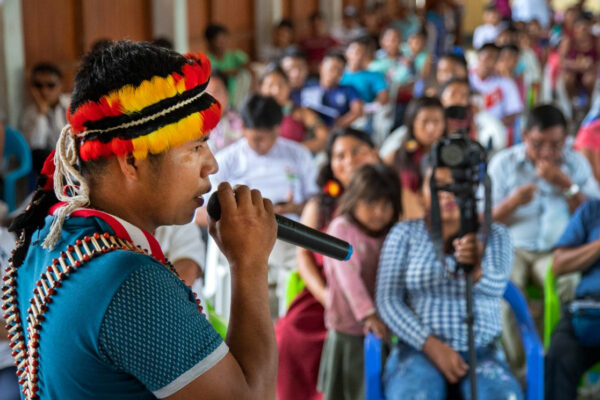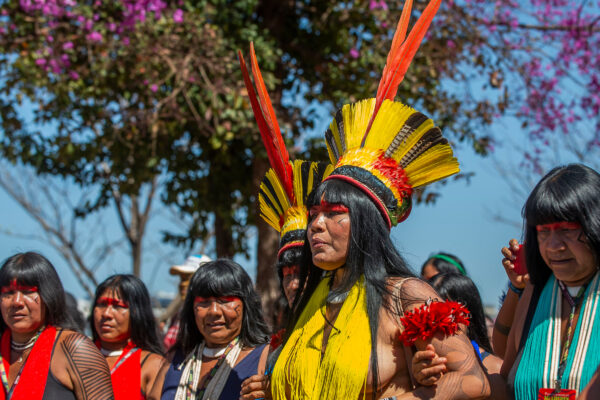Quito – A mayor from northern Ecuador sent an anguished cry
for help against the bloody military repression against a strike caused by
the laying of the Heavy Oil Pipeline in the Amazon rainforest. “Please help
us, please help us, they continue to shoot up my city. Right here a
compañero of the mayor’s office fell wounded,” Guadalupe Llori, mayor of
Coca, capital of the northeastern province of Orellana shouted over the
telephone. Her conversation with IPS was eloquent, but it was interrupted
after a few minutes. When it was reestablished, she told us that the
townspeople, enraged by the military repression, had set the local offices
of the electric company on fire.
Two children and two adults died between Tuesday and Thursday in the
repression, according to extraofficial reports. Some 40 people were detained
by the army, while different health centers in Orellana treated more than
300 people wounded by the soldiers.
The Minister of the Interior, Marcelo Merlo, denied that the repression had
caused deaths and accused the local governments and organizations that had
organized the protest of “blackmail” for demanding compensation from the OCP
(pipeline) consortium.
“There are civilians with bullet wounds. Helicopters threw year gas bombs
against the population. The provocation is angering the people, who went out
to protest in a peaceful way. It’s necessary for the people in Quito to know
the truth of what is happening here,”
The northeast Amazonian provinces of Orellana and Sucumbios have demanded
that the government pressure OCP Ltd, the company building the Heavy Oil
Pipeline, for $10 million for social works as compensation for the damage
caused by the pipeline. The people have blocked roads, taken over oil wells,
and occupied the Coca airport and the offices of the TAME airline in Nueva
Loja, the capital of Sucumbios. According to government reports, the
protests have caused the suspension of operations at 62 oil wells and one
refinery, which has caused petroleum companies to lose $2.21 million
dollars.
The Ecuadorian government declared a state of emergency on February 22 in
Sucumbios and February 23 in Orellana, when the protests had just begun,
with the excuse of protecting the border after the breakoff of peace talks
between the Colombian government and the insurgent Revolutionary Armed
Forces of Colombia. (The province of Sucumbios is on the Colombian border.)
Nevertheless. Presidentg Gustavo Noboa declared on February 25 that the
state of emergency was a response to the protests.
“We can’t have a dialogue while bombs are falling over us and they want to
take us prisoner, the local authorities who participated in the strike,”
said Mayor Llori. The commander of the Fourth Division of the Armed Forces, Jorge
Miño, who is in charge of the operation, has ordered her captured. Three
local radio stations, Stereo Cumandá, Alegría y Municipal,
have been forced by the military not to divulge information about the
repression, said the president of the Ecumenical Commission for Human
Rights, Elsie Monge.
In February of last year, townspeople, Indians, peasants, tradespeople and
local authorities of Orellana and Sucumbios carried out a similar strike to
demand roads and electrification, since most roads are unpaved and
electricity is restricted to eight hours a day. The government promised to
carry out works in three months to solve the problems in these provinces,
from which 60 billion dollars worth of oil has been extracted in the last
twenty years, according to official figures, and in which 90% of the
population lives in conditions of poverty.
But a year has passed and the government has not kept its promises. The
provincial representatives announced a new strike with the same demands and
with the support of the small and medium farmers who were affected by the
drop in coffee prices. “We are demanding that they keep the promises made
last year and encourage production in the province,” prefect Bermeo told the
radio station La Luna de Quito. The governor of Sucumbios declared that, as
long as the promises were not kept, they would not permit the construction
of an oil pipeline that would cause serious environmental damage and give
billions of dollars of profits to the oil companies without the most minimal
compensation for the people of the region. “The situation of the campesinos
is distressing. The majority are small coffee producers and the price has
fallen abruptly, and they receive no subsidies for buying fertilizer or
credits to support them in improving production,” declared the governor.
The campesinos of Orellana are struggling in order to imprive their
production so that won’t be forced to cultivate coca, Pedro Garcia, a farmer
of the province, told IPS. “We want to continue planting coffee or some
other profitable crop, but for this we need credits, subsidies, roads to
transport our harvest. If not, we will have to plant coca,” as has happened
in Colombia, Peru, and Bolivia, he insisted. Garcia explained that “strange
people” have approached him offering to pay five to seven times as much for
coca as he receives from coffee. “Coca is a more resistant crop, and they
will give us everything we need in order to cultivate it, they pay five to
seven times as much as for coffee, and they take out the crop from our farms
for us. If the government doesn’t help us, we are being pushed into planting
coca,” Garcia said. Many campesinos along the Colombian border in
Sucumbios have lost their crops due to the fumigations on the Colombian side
with the herbicide glyphosate.
The organizers of the protests have proposed that a commission made up of
congressional representatives of different parties, who have already met
with President Noboa, come in person to see the situation in Orellana and
Sucumbios and open dialogue with the goverrnment, which refuses to
negotiate. Congressional representative Nina Pacari, a member of the commission
[and a member of the indigenous party Pachakutik] insisted that the repression
ordered by the government and the aggressive declarations of functionaries
such as Minister Merlo only provoke resentment. “It’s not possible to
dismiss as ‘blackmailers’ the people of two of the provinces that have for
years contributed a high percentage of the govenment’s budget, while they
continue to live in poverty. The declarations of the government are unjust
and inhumane, ” Pacari concluded.
The two provinces remain under a state of siege and curfew, and anyone who
violates the restrictions are subject to the Military Penal Code.













